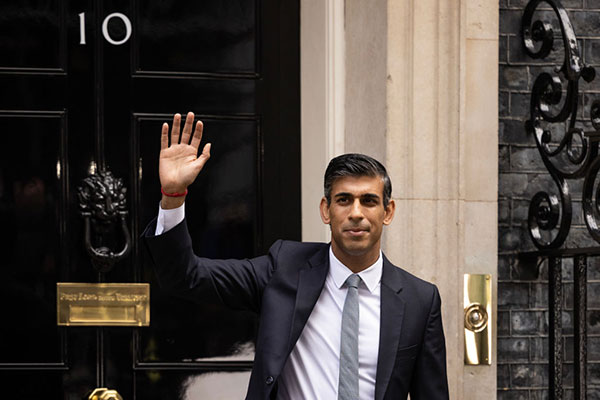Do British prime ministers influence economic growth?
7th November 2022 11:42
by Alice Guy from interactive investor
As the third prime minister in two months takes office, we ask if it’s possible for prime ministers to promote economic growth and ward off a recession.

The brief and disastrous reign of Liz Truss reminds us how hard it is for prime ministers to promote growth and how it is often easier to damage an economy than to build it. As Winston Churchill warned: “to build may have to be the slow and laborious task of years. To destroy can be the thoughtless act of a single day.”
New leaders and their parties typically start off promising to improve the economy and GDP, and Truss did that in spades. But do they really have a big impact? Are they better at damaging the economy than adding value?
For Liz Truss, her ill-fated day was 23 September as her chancellor Kwasi Kwarteng announced an ambitious “growth plan” of £45 billion worth of unfunded tax cuts. The stock market reaction was savage and fears of escalating government debt and increasing inflation sparked a huge sell-off. The Bank of England stepped in to support pension funds and prop up gilt prices.
Tail between her legs, Truss was given her marching orders and became the shortest-serving British prime minister with only 45 days in office.
- Read about: Share prices today | Opening a Stocks & Shares ISA | Free regular investing
Lessons hopefully learned, another new prime minister, Rishi Sunak, now enters Number 10 with the domestic economy in crisis. Latest forecasts from the Bank of England predict a long recession ahead. And the mood music from the Treasury is of tax rises rather than tax cuts.
Of course, the current crisis is far from unique. In fact, one of Margaret Thatcher’s first tasks in 1979 was to increase taxes in an effort get inflation under control. High unemployment and a recession followed.
The previous decade, Harold Wilson’s Labour government began work with a massive current account deficit, a pound in retreat and the beginning of a long-running sterling crisis. Gordon Brown and Boris Johnson both faced once-in-a-lifetime events – the financial crash and Covid pandemic respectively – the year after each took office.
Others have had it easier, or done better. Harold Macmillan won a second term in 1959 following a period of economic improvement. As Macmillan said himself a couple of years before: “Most of our people have never had it so good.”
But take a closer look at GDP growth stretching back to Anthony Eden in 1956, and it’s clear that in many circumstances, politicians have little influence on the trajectory of the UK economy during their time in office, such are the far greater forces at play outside their control such as economic cycles and global trends. There’s also an inevitable policy overlap from one PM to the next, and often a significant lag in implementing policy changes, so PMs take time to become effective.
- Here’s how UK interest rates compare with others around the world
- Autumn Statement 2022 preview: how you could be paying more tax in 2023
Under Maggie Thatcher, for instance, GDP growth actually declined and the economy contracted during her final years in office. John Major inherited 14% interest rates and inflation near double digits. Several prime ministers afterwards could claim only modest improvement, most likely attributable to the great moderation, a period of unusually stable macroeconomic activity in developed economies from 1993 to 2007, which followed the classic boom and bust period of the late ’80s and early 1990s.
A healthy dose of “good luck” rather than skill and judgement were to thank for that, argued former Bank of England Monetary Policy Committee member Charles Bean. And in a further blow to subsequent prime ministers, the low interest rates and low apparent risk of the period incentivised financial institutions to become highly geared, which laid the groundwork for the financial crisis.
Boris Johnson demonstrates perfectly how PMs are very often victims of circumstance and can’t be judged solely on economic policy in terms of GDP. The larger-than-life politician bookends the table of UK economic growth of the past 60 years, with Covid – not Johnson – causing a painful 9.3% contraction in 2020. It was followed a year later with record growth of 7.4%. Again, Covid inspired, but government aided.
Before Johnson’s pandemic-inflicted volatility, Edward Heath almost performed the same trick, but in reverse, topping the table with growth of 6.5% in 1973 followed by a 2.5% decline in 1974.
We’ll soon see what influence Rishi Sunak is able to exert on the economy. Domestic policies can only do so much. To make his mark he must burst the inflationary bubble while avoiding a full-scale recession, solve the global energy crisis and navigate world events such as climate change, which cost the global economy hundreds of billions to tackle. Good luck, Rishi!
These articles are provided for information purposes only. Occasionally, an opinion about whether to buy or sell a specific investment may be provided by third parties. The content is not intended to be a personal recommendation to buy or sell any financial instrument or product, or to adopt any investment strategy as it is not provided based on an assessment of your investing knowledge and experience, your financial situation or your investment objectives. The value of your investments, and the income derived from them, may go down as well as up. You may not get back all the money that you invest. The investments referred to in this article may not be suitable for all investors, and if in doubt, an investor should seek advice from a qualified investment adviser.
Full performance can be found on the company or index summary page on the interactive investor website. Simply click on the company's or index name highlighted in the article.